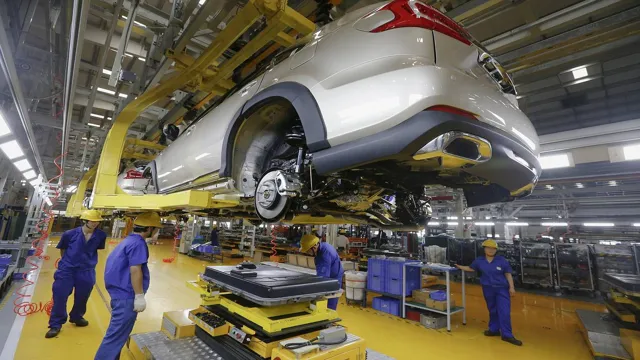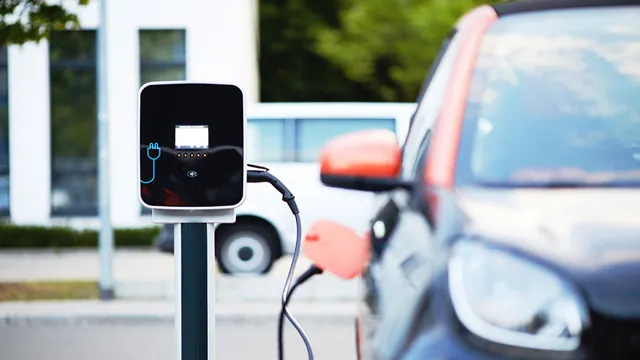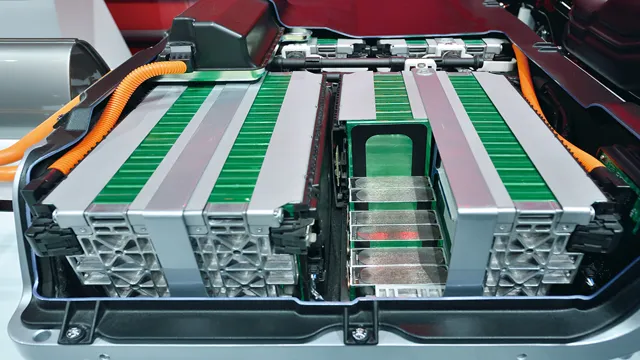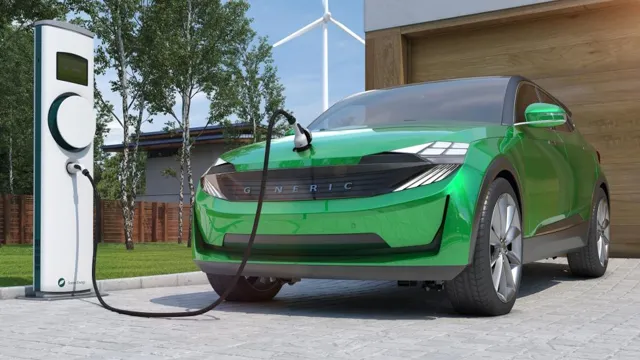Powering the Future: Your Comprehensive Guide to Electric Car Batteries
Electric vehicles have been around for quite some time, but their popularity has soared over the past few years. The increasing demand for green energy sources to combat climate change has resulted in a massive shift towards electric cars, which produce energy without polluting the environment. However, one of the significant concerns among electric car owners is the battery life and how long it lasts.
In this Electric Car Battery Wiki, we’ll dig deeper into the science behind electric car batteries, their functionality, and everything that you need to know about them. Whether you are thinking of buying an electric car or considering a battery upgrade, this article will give you all the information you need. Let’s dive in!
What is an electric car battery?
Electric car batteries are rechargeable batteries that power electric vehicles. They are made up of multiple cells arranged in series and parallel combinations. Each individual cell contains an anode, a cathode, and an electrolyte, which allow for the transfer of electrical energy.
The battery supplies electrical power to the electric motor, which drives the wheels of the vehicle. These batteries can be charged by plugging them into an electric power source, such as a wall outlet or a charging station. The type of battery used in electric cars is typically a lithium-ion battery, which is known for its high energy density and efficiency.
Electric car batteries have become increasingly popular due to their environmentally-friendly nature and low operating costs. With advancements in technology, electric car batteries are becoming more efficient, smaller in size, and less expensive to produce. As a result, the demand for electric cars is expected to continue to grow, leading to further innovation in the development of electric car batteries.
So if you’re thinking of buying an electric car, just remember that the backbone of its performance is its battery.
Components of an electric car battery
An electric car battery is the heart of an electric vehicle and it provides the necessary power to run the car’s electric motor. Although an electric car battery might look very similar to a traditional car battery, the components, capacity, and performance are vastly different. Electric car batteries typically use lithium-ion technology, providing high energy density, low weight, and long battery life.
These batteries are made up of various components, including the cathode, anode, electrolyte, separator, and a protective casing. The cathode and anode are the positive and negative terminals of the battery, while the electrolyte is the substance that facilitates the ion transfer between the two terminals. The separator is a thin layer between the anode and cathode, preventing them from touching and causing a short circuit.
The casing provides protection from any damage to the battery. All these components work together to provide a reliable and efficient source of energy for electric vehicles.
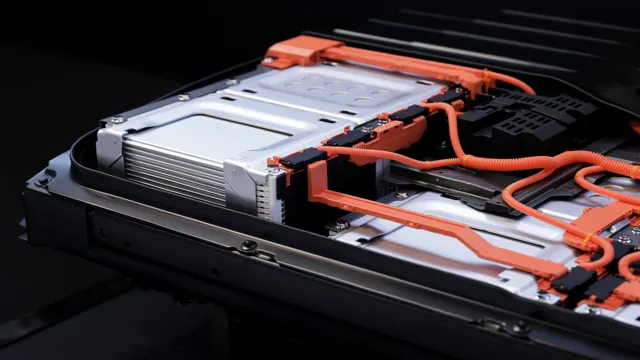
Types of electric car batteries
An electric car battery is the heart of an electric vehicle and is responsible for powering the electric motor. There are two main types of electric car batteries: Lithium-ion (Li-ion) batteries and lead-acid batteries. Lithium-ion batteries are the most common type of battery used in modern electric vehicles because they offer a higher energy density, longer lifespan, and faster charging times compared to lead-acid batteries.
On the other hand, lead-acid batteries are typically found in older electric vehicles or hybrid vehicles and are less efficient, heavier, and have a shorter lifespan than their Li-ion counterparts. When looking to purchase an electric vehicle, it’s important to consider the type of battery used as it will impact the overall performance and range of the vehicle. So whether you choose Li-ion or lead-acid, the battery is an integral part of any electric vehicle and needs to be carefully considered before making a purchase.
How does an electric car battery work?
An electric car battery is a complex device that converts chemical energy stored in its cells into electrical energy. In essence, the battery produces an electrical current that powers the electric motor, which propels the car. A typical electric car battery is composed of several individual cells, each comprising a positive electrode, a negative electrode, and an electrolyte.
These cells work together to create an electrical circuit, allowing the current to flow and power the motor. One important thing to note is that electric car batteries require periodic recharging in order to maintain their capacity. They can be charged using an external charging station or a regular household outlet.
Once fully charged, an electric car battery can provide several hours of driving time. Overall, electric car batteries are sophisticated and reliable devices that are essential to the operation of electric vehicles. As the popularity of electric vehicles continues to grow, it is likely that we will see further advancements in battery technology.
Charging an electric car battery
Electric car batteries work differently than traditional gas-powered car batteries. They store energy in rechargeable cells made of lithium-ion, which are capable of holding a lot of energy in a small space. When you charge an electric car battery, an electrical current flows through the cells, causing the lithium ions to move between the anode and cathode.
This process is reversible, so when the car is in use, the lithium ions move back and forth between the two electrodes, producing electricity that powers the motor. The strength of the battery depends on the number of cells within it, and the larger the battery, the more energy it can store and the farther the car can travel on a single charge. Additionally, the charging times for electric car batteries can vary depending on the type of charger used and the size of the battery, with some high-powered chargers capable of charging a depleted battery in just minutes.
Discharging an electric car battery
Electric car batteries are a crucial component that makes electric vehicles possible. These batteries store energy that powers the electric car’s motor. Essentially, they work like any other battery, converting chemical energy into electrical energy.
When the battery is produced, it is fully charged and ready for use. However, as you drive, the battery’s charge decreases, and eventually, it needs to be recharged. This is where discharging comes in.
Discharging the battery refers to using the stored energy in the battery to power the electric motor. As the battery is discharged, the chemical reaction within the battery cells generates electrical potential and current that powers the motor. The level of discharge depends on how far you drive and how much energy the car requires to operate.
Once the battery is discharged, it needs to be recharged either through regenerative braking or plugged into a charging station. Overall, understanding how an electric car battery works is crucial to maximizing the car’s efficiency and lifespan.
Battery efficiency
Electric car batteries are the heart of the vehicle’s power system, providing energy to propel the car forward. These batteries use a different chemical process compared to traditional gasoline engines. Instead of burning fuel, they convert stored electrical energy into mechanical energy to move the car.
The batteries are comprised of several cells that work together to produce enough power to run the car. These cells use a combination of chemicals, including lithium-ion, to create electricity when charged. When a driver presses the accelerator pedal, the battery sends an electric current to the motor, which then converts the energy into movement.
The efficiency of an electric car battery determines how far the car can travel on a single charge. Higher efficiency means longer driving range and better performance. Battery makers constantly look for ways to improve efficiency by reducing the weight of the battery and increasing its capacity.
As the demand for electric cars increases, improving battery efficiency will be key to their success.
Benefits of electric car batteries
Electric car batteries have become an increasingly popular choice for environmentally conscious drivers. One benefit of electric car batteries is that they have a long lifespan, reducing the need for frequent replacement. Additionally, electric car batteries can be charged using renewable energy sources such as solar power or wind power, making them a more sustainable option.
The use of electric car batteries also reduces greenhouse gas emissions and air pollution, contributing to a cleaner, healthier environment. Furthermore, electric cars are typically quieter and smoother to drive than traditional gasoline-powered cars, providing a more enjoyable driving experience. While the initial cost of purchasing an electric car and its battery may be higher, the long-term benefits make it a worthwhile investment for those committed to reducing their environmental impact.
Overall, the benefits of electric car batteries make them an attractive and practical option for drivers looking to make a positive impact on the environment.
Environmental impact
The environmental impact of traditional gasoline-powered cars is significant, so it’s no surprise that many people are switching to electric cars, which have numerous benefits over their gas-powered counterparts. One of these benefits is the impact that electric car batteries have on the environment. Unlike traditional car batteries, which often contain lead and other toxic chemicals, electric car batteries are much cleaner and typically contain lithium-ion instead.
This means that they are less harmful to both people and the environment. Furthermore, when the battery is no longer usable in an electric car, it can often be recycled and repurposed into something else, reducing waste and harm to the environment. Overall, electric car batteries are a significant step forward in reducing the negative impact that cars have on the environment.
Cost savings
When it comes to cost savings, electric car batteries offer a multitude of benefits. One of the most significant advantages is their long lifespan, typically lasting between 8-10 years. This means that the need for frequent replacements is significantly reduced, saving owners the cost of purchasing new batteries often.
Additionally, electric cars require less maintenance compared to gasoline-powered vehicles, reducing the cost of maintenance. Another cost-saving benefit is the lower cost of electricity compared to gasoline. This translates into significant savings in the long term, making electric cars a more cost-effective option.
Moreover, many regions offer incentives and rebates, such as tax credits, for buying electric cars. These rebates can range from a few hundred to several thousand dollars, depending on the model and the state where it’s purchased. In conclusion, electric car batteries offer cost-saving benefits such as reduced battery replacement, lower maintenance costs, lower fuel costs, and possible incentives and rebates, making them a wise investment for those looking to reduce their expenses.
Future of electric car batteries
Electric car battery technology has come a long way in the last decade, but there is still a lot of room for improvement. The future of electric car batteries looks bright, with many exciting innovations on the horizon. One area of focus is increasing energy density, which will allow for longer driving ranges and faster charging times.
Another promising development is solid-state battery technology, which uses a solid electrolyte instead of a liquid one. Solid-state batteries have the potential to be safer, more efficient, and longer-lasting than traditional lithium-ion batteries. Additionally, researchers are exploring the use of nano-engineered materials and artificial intelligence to improve battery performance.
With so much investment and research going into electric car batteries, it’s clear that they will continue to evolve rapidly in the coming years.
Conclusion
In conclusion, the electric car battery is the heart and soul of any electric vehicle. It stores the energy required for the car to run and makes it possible for us to reduce our carbon footprint and move towards a sustainable future. With advancements in technology, electric car batteries have become more efficient, affordable, and reliable, making them a practical option for everyday use.
So, next time you’re considering buying a car, remember that an electric car battery not only saves you money on gas but also helps protect our planet. It’s time to make the switch and join the electric revolution! Plus, you can finally tell your friends that your car has a power source that is light-years ahead of that outdated gas tank.
FAQs
What is an electric car battery?
An electric car battery is a rechargeable battery that powers the electric motor of an electric vehicle.
How long do electric car batteries last?
The lifespan of electric car batteries varies depending on factors such as usage, temperature, and charging habits. Generally, electric car batteries last between 5 to 10 years before needing replacement.
How much does it cost to replace an electric car battery?
The cost of replacing an electric car battery depends on the model and make of the car. Generally, the cost can range from $3,000 to $10,000.
Can electric car batteries be recycled?
Yes, electric car batteries can be recycled. The most valuable parts of the battery, such as the cathode and anode, can be recovered and used to manufacture new batteries or other products. Recycling also helps to reduce the environmental impact of electric car batteries.
How do I maintain my electric car battery?
To maintain your electric car battery, you should avoid overcharging or completely discharging it. It is also important to keep the battery at a moderate temperature and avoid exposing it to extreme heat or cold. Regularly performing battery checks and maintenance can help prolong the lifespan of your electric car battery.

